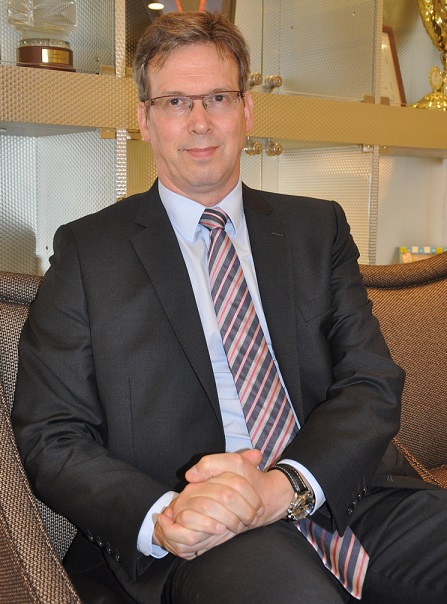歐洲日 - 民主,尚待完成的工作
歐洲日 - 民主,尚待完成的工作

一九五零年五月九日,時任法國外交部長羅伯特•舒曼 (Robert Schuman) 呼籲歐洲統一以避免戰爭在歐洲大陸發生,並把和平與繁榮傳播到世界各地。舒曼的聲明得到其他五個歐洲國家的正面回應,包括法國昔日的敵人 ─ 德國。這拉開了歐洲逐漸融合的帷幕。從此,五月九日被稱為歐洲日,以慶祝歐盟如何克服歐洲各國歷史悠久的差異,塑造一個共同的未來。
在全球各地,無論是在開羅或基輔,人們都想要歐盟裏所擁有的個人權利和自由、民主施政、法治和體面的生活。從烏克蘭的事件可見,我們不能把這些價值視作理所當然的。在今天的歐洲,我們仍視民主為一個尚待完成的工作,我們都有責任維護並培育它,並會支持想要民主的一方。
歐盟制定了共同外交政策,以確保我們的聲音被關注。面前重大的議題,如局勢不穩定的國家,傳染病,能源安全,氣候變化和遷移,我們合力面對比個別面對更能有效地解決問題。我們通過由歐盟外交和安全政策高級代表凱瑟琳•阿什頓 (Catherine Ashton)帶領的歐洲對外行動署 (European External Action Services),宣揚歐盟的價值觀和關注,並以人權為中心思想。
歐盟也在地區安全問題上扮演重要角色。高級代表凱瑟琳•阿什頓領導了與伊朗會談的歐盟3+3會議(德國,法國和英國以及美國,中國和俄羅斯)。這些談判促使一項有關伊朗核計劃的臨時協議,是促使危機降温關鍵的一步。另一方面,在非洲之角,透過與索馬里政府作政治對話、我們的海軍任務ATALANTA以及具針對性的發展援助和人道援助,海盜數目已經減少了95%。當天駕駛海盜船的年輕人,今天己回到岸上上學去。
二零一四年是歐盟特別的一年。十年前十個新成員加入我們的聯盟,其中八個在此以前是所謂的鐵幕國家。因此,二零零四年擴大標誌着歐洲大陸數十年分裂的結束。自此以後,再有三個成員加入,可見歐盟的具持續性的吸引力。
今年對於歐洲公民來說亦是特別的一年。由五月二十二日至二十五日,他們將在歐洲議會選舉中投票。歐洲議會的意見於歐洲大部分地區具決定性。這意味着歐洲公民能夠為歐盟塑造未來。
六十四年前,羅伯特•舒曼呼籲了促使今天歐盟發展決定性的一步。歐洲日標誌着過去的成就,但更重要的是研究如何進一步在我們的家,歐洲,以及整個世界,塑造我們的未來。
--------------------------------------------
Europe Day – Democracy is a constant work in progress
On 9 May 1950, in the wake of World War II, Robert Schuman, the then Foreign Minister of France, called for the unification of Europe in order to make war on the continent impossible and to spread peace and prosperity globally. Schuman's declaration drew a positive response from five other European countries, including Germany, France's erstwhile foe. This kicked off the Europe's gradual integration. And 9 May came to be called Europe Day –the day to celebrate how the EU has overcome age-old differences to shape a common future.
Around the globe, whether in Cairo or Kiev, people want what we have in the EU: personal rights and freedoms, democratic governance, rule of law and a decent living. Events in Ukraine show that we cannot take these values for granted. In today’s Europe, we see that democracy is a constant work in progress; we share a responsibility to safeguard and nurture it. And we will stand by those who call for it.
The EU created a common foreign policy to ensure that our voice is heard. In the face of big problems such as fragile states, pandemics, energy security, climate change and migration, we are more effective together than individually. Through the work of the European External Action Service, led by Catherine Ashton, the EU's High Representative for Foreign and Security Policy, we promote the EU values and interests around the world, with human rights as a silver thread.
The EU also plays an important role in regional security issues. High Representative Catherine Ashton leads the talks of the EU3+3 (Germany, France and the United Kingdom as well as U.S., China and Russia) with Iran. These talks resulted in an interim agreement on Iran's nuclear programme last November-- a crucial step towards de-escalating an emerging crisis. Take also the Horn of Africa, where thanks to a combination of political dialogue with the Government of Somalia, our naval mission ATALANTA, and targeted development aid and humanitarian assistance, piracy has been reduced by 95%. Today the young men that used to man pirate ships are going to school.
2014 is a special year for the EU. Ten years ago ten new members joined our Union. Eight of them were previously behind the Iron Curtain. The 2004 enlargement thus marks the end of decades of division on our continent. Since then three more members have joined: a testimony to the continuing attraction of the EU.
This year is also special for European citizens. From 22-25 May they will vote in the elections for the European Parliament. A Parliament whose say has become determining in most areas. This means citizens will be able to shape the EU for the years to come.
For sure, boosting growth and job creation will remain at the top of our agenda. We have exited the financial crisis and confidence has returned to our markets. Translating economic confidence into jobs and rising income will take time. But until European citizens have regained a sense of a perspective, our mission is not complete.
One thing stands: the EU Union is stronger now than in 2008 when the financial crisis hit. The many analysts who predicted the EU's and/or the Euro's demise were wrong. The EU is better equipped for its task now than before. For those who have never lived inside the EU, it is hard to realise how strong the interdependencies within the EU are (in fact: a European who never lived in Hong Kong will not grasp the myriad inter-connections between Hong Kong and Mainland China). Such inter-dependencies create a common destiny, a common future and solidarity. Even though we are different and diverse. Or maybe one should say: by nurturing the differences and diversity. Sixty four years ago Robert Schuman called for the set-up of what today is the European Union. But he always understood this as a union in diversity. "Unity in diversity" is now the motto of the EU, a key ingredient of its growing strength at home and abroad. In 2014, the world commemorates one century after the outbreak of world war I. The EU, which was the crucible of both world wars, is in today's multi-polar world striving to achieve peace and security, prosperity through trade and investment and deepen people-to-people exchanges.
Vincent Piket, Head of the EU Office to Hong Kong and Macao





